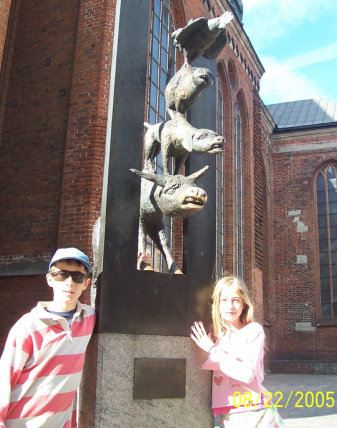 As I write this, Lisa and I are waiting for our flight to Sarajevo, Bosnia, from Riga, Latvia. Latvia is one of the few places we will visit this fall that is not new to us. We were last in Riga in August, 2005, when we taught two conferences, one for student leaders and one designed for seekers and their Christian friends, at which we gave evangelistic talks from the gospels. One of the staffworkers at that time is now the director of the LKSB (the IFES student movement in Latvia), and he invited us back to speak to graduates of LKSB. We came on Thursday from Belarus and I spoke on what it looks like to be faithful in our vocations, finances, and communities, at the conference that ended yesterday. We met several former students who attended the conference in 2005 and remembered us, including one former student who is on staff now. The picture here is of our kids nine years ago as we wandered through old-town Riga. It was very encouraging to meet about 40 graduates of the LKSB (and to meet their 30 kids!). As our friend Igors reminded us, the older ones in this group are really the first generation of a renewed and growing Latvian church. After the fall of the Soviet Union, they were the generation who came to university in the early 1990s, just after it became even possible to follow Jesus as a university student. They are now thriving and taking risks in faith even in the ways they practice parenting: we met several families who have adopted one or more Latvian orphans, and several talked about being part of church plants or otherwise very active in their churches. Nine years ago, a highlight of our time at camp was the "Extreme Hike" which was a combination challenge course and treasure hunt, where teams needed to follow maps and compete at several destinations along a route in the wilderness. Our kids were on teams with the other college students and had a great time, though they didn't return to camp until after midnight. Well, this week at camp another Extreme Hike was scheduled, with six teams setting out at 9PM and returning to camp between 1 and 2 AM. Lisa and I, the wimps that we are, took a much shorter hike with a woman who has six children in foster care or adoption, and her four youngest children. We found toads and lizards and were blessed to hear her story of following God in this way , but our hike lasted less than an hour, and then we headed on to bed. The next day, when I might have expected some to complain about how long the hike took and how late they returned, I heard only positive comments about the hike from the participants, adults and kids alike. In general, during the three day camp, the weather was a bit rainy and cold at night, in our unheated and breezy cabins, but Latvians are a hardy bunch, and all seemed to enjoy their time at camp, as they were with their larger family of believers for time in fellowship, worship and the Word. 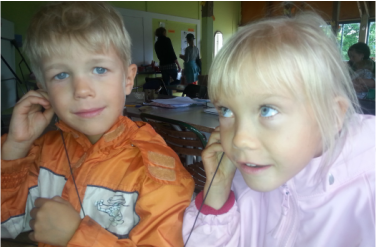 Two of the four kids we hiked with, as they listen to a Bach Piano cantata on my computer. Armands (left) held my hand during most of our evening hike, so when we found a toad, he gave me his homemade bow and arrow so he could hold the toad in one hand and still hold my hand. He wanted to bring the toad to the cabin, but I think his mom Tia said "No" to that idea. Also pictured is Linda (pronounced "Leenda, as in "Leenda Beleenda").
1 Comment
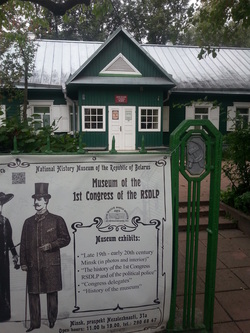 This is the place it all began: the birthplace of the first Congress of the RSDLP (Russian Social Democratic Labour Party), in Minsk in 1898, where Lenin convened the meeting of several groups to join forces for the sake of the socialist vision. However well meaning these early party members were, the disaster that cast a pall over a large swath of humanity for most of the twentieth century still lingers, with human and cultural costs that will accumulate for decades to come. Most of our travel and teaching this year will be in countries that have been indelibly marred by the movement that began in this house in Minsk. 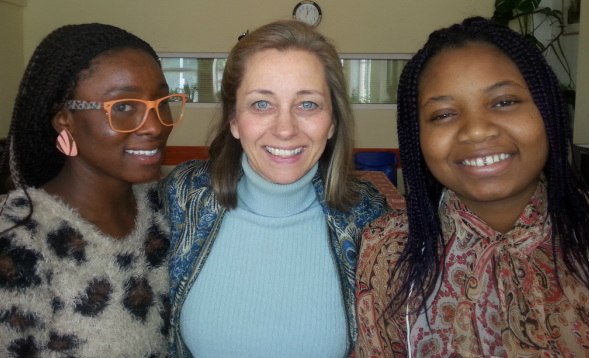 Tiwa and Kemi with Lisa at the camp with student leaders in Belarus. Nine Nigerian students joined in the leadership conference there. Because they spoke English (and Russian), the Nigerians were some of the students we got to know the best. 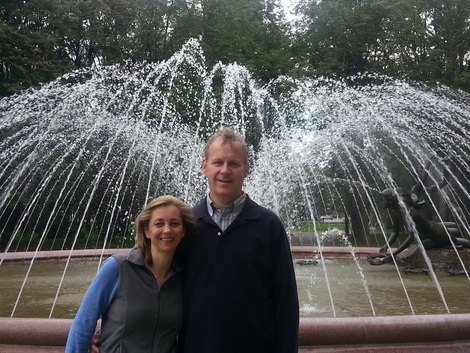 If you’ve followed our blog, you’ve heard us waffle on whether to name a few of the countries in which we are working, since their governments are not so friendly to churches. In Belarus, where we have been the last several days, pastors are occasionally detained by the police; it is difficult for churches to own their buildings, and in a number of other ways their freedom is restricted. But we have been assured that it is alright to name the country and first names of leaders here in our blog. We head to Latvia in just a few hours and are meeting with a pastor couple in half an hour before we head to the airport, but I’ll squeeze in a few reflections on our time here, a smattering of impressions more than a comprehensive summary:
As we came back together a woman burst out, “I am normally shy but I need to tell you about a day recently where I was out in the forest, roaming around like usual, when suddenly all my friends started going wild. It was as if we’d been attacked, but I couldn’t see our attacker! The others all started rushing for the cliff, and something in me really wanted to join them….” She went on to tell the story of the Gerasene Demoniac, from the perspective of one of the pigs. She shared that she had been a drug addict and had seen friends go over the cliff of suicide. It was incredibly moving, and a great privilege to learn her story. I could have sat in a room with her for hours and taught principles and points, and never learned this part of her life. But such is the power of story. I am eager to develop this session and shape it for use in other settings along our journey this year. That’s it for now—much more to share but we are off to Latvia. We ask your prayers as we gather with graduates of the student ministry there for a retreat on post-college issues: money, relationships, calling and career, parenting, etc. We have no down day between these two—we’ll be glad to have that before the next event. But this time that just wasn’t in the cards, so do pray for stamina in this quick turnaround. We are so grateful for your friendship and prayers! 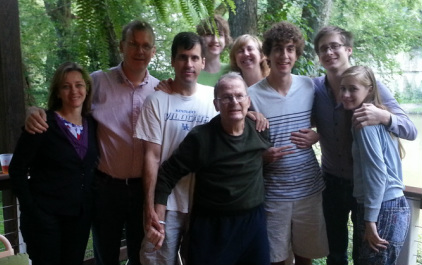 A partial family reunion on the Kentucky River with my dad, my brother Dave and his wife Shannon, their two boys Nathan and Noah, and our kids, Mark and Becca. My dad is literally surrounded and supported by his family. August 12, 2014 Since this picture was taken, we have flown to Eastern Europe and have begun our first event. Lisa and I enjoy precision with words, and wrangling over the proper use of words. When we were in Kentucky, I would occasionally talk about "going home" which sloppily meant, for me, going back to the hotel we were staying at in Lexington while visiting my father and seeing some of my siblings and nephews. Lisa would correct me: the hotel is not home. And, in fact, we weren't going "home" if home meant, as it usually does, the place one lives, since we had, the previous week, moved out of our home in San Gabriel. No, we wouldn't be going home for a long time.
When we arrived here in our current (undisclosed) location, Lisa announced that she would forgo this usual bit of verbal skirmish: from now on, our "home" is wherever our luggage currently resides. So we can talk about going on a walk and then, at some point, turning back for "home," to our room at the conference facility. Our blog, after all, is called "One Hundred Homes" because we have decided to make our home wherever we are and with whomever we are with at the time. We expect that we will enjoy dozens of homes before our trip concludes in a year's time. So far, we are on number 8 (counting the seven different places we stayed in Russia and Central Asia during July). So we are home again, in a new city and country for us, among people we have just met but are already starting very much to enjoy and have affection for. The conference teaching starts in a couple hours, and will involve eleven sessions between us over the three days. As we gather with people in Jesus' name, gathered around his Word to pursue his purposes in all of our lives, we find we are, truly, at home. We were back from Russia and Central Asia for three weeks before we left yesterday for our first stop. During that time, we spent about 10 days packing up our house. Then we took a week in Kentucky to spend time with my elderly dad as he was transitioning from his independent living situation to assisted living. The transition went well and he's in pretty good spirits, all things considered. During that week we enjoyed a visit from our son Mark, who lives in London but who came to Lexington for the week, and with our daughter, who was with us before she left for her second year of college in Washington, DC. Then, finally, we came back to Southern California for a final week of preparations before we caught the plane this morning. During our last week, we had good family time with Lisa's sister Ruth and her mom, both of whom have some health issues but are doing relatively well.
I am writing this as we fly from LA to Chicago, at which point we catch a flight to Warsaw, and then on to our final destination, a capital city east of Poland. I had a few reflections on our trip so far. Some of these I have found myself sharing with friends who have asked about our first month's trip, and I thought I would share them in this post, which I will do when we land.
We are always eager for news from home, so feel free to email us, or message us on Facebook, and we'd relish the chance to catch up with you via Skype as well. Thanks for your interest in our ministry, and here's specifically how you can pray for the weeks ahead:
 Of the many memorable and inspiring talks I’ve heard at Urbana, one of the most striking moments for me (Lisa) came when a longtime friend and heroine of missionary fearlessness shared a personal fact that I’d not known, before 18,000 listeners. Despite her decades of travel, this unstoppable proclaimer of the gospel is afraid of flying! She shared with disarming charm about her sweaty brow as each plane departs. Knowing this makes her even more of a hero to me as she continues to circle the globe on missionary endeavors. She is not fearless; rather, she works hard to overcome her fears and other weaknesses in Jesus’ strength. So here is one of my weak points, as we begin a year of travel: I’m a terrible sightseer. I’m secretly relieved our journey won’t include tons of that. I think I bring a few strengths to the table for our journey, on the ministry side of things. I’m not bad at connecting with people; I’m willing to suffer a reasonable amount for the chance to teach and mentor others; and I’m pretty flexible in the realms of food put in front of me and new modes of transportation or accommodation. I can put the toilet paper in the bin instead of the toilet every time if you ask me to. What’s harder for me is the day that is supposed to be fun because it is so, so epic. Like, say, The Hermitage, in St. Petersburg, a sight many Americans would love to see and which, embarrassingly, was nearly a bust for me. What exactly is it that makes sightseeing, particularly in art museums, so challenging for me? For starters, body parts: I have a downright miniscule bladder. The Hermitage is outfitted with approximately three jillion paintings, and yet it boasts stunningly few bathrooms, indeed none at all on the floors where most of the art is. In July, the lines of women ooze like sludge out the doors of said few bathrooms. It was crushingly crowded and our cell phones were non-operational, so to avoid estrangement my poor husband, endowed though he is with a bladder the size of a gas tank, had to trudge more than once back to the restroom, away from the art, and wait for me. More body parts: my feet become tired and sore more quickly than those of more stalwart travelers. Long periods of walking and standing cause my back to ache and my feet to beg for a long soak. I knew we were in for a tougher time at the museum when our nearest subway stop’s entrance was inexplicably closed. We looked at the map and found another stop, Baltiskaya, and since on the map it was just, oh, an inch or two away, we thought, “No problem!” As the blocks stretched on with no signs indicating we were nearing it, I decided to ask a local. I made exaggerated shrugging gestures with my shoulders and upturned hands, and said, “Baltiskaya?” She launched into a lengthy Russian dissertation on (I’m guessing here but pretty sure) the glories of the hero Baltisky and the whereabouts of the subway stop that immortalized his exploits. Then shook her head as if to say, “But what a pity that my erudition is wasted on a complete idiot.” Not a single directional gesture peppered her impassioned speech. From my limited observation, the Russians are at the far end of the scale from the Italians in the gesticulation department. We walked on, and did eventually find it, but I groaned at the fact that my feet were already tired with the whole Hermitage ahead of us…. Even more distressingly, I suffer from gaze-inferiority complex. I’ve always wished for a greater appetite for art, for the capacity and the desire to stare at paintings at length, turning away at last only wistfully, as if being ripped from one’s lover at the airport. This was only accentuated by getting a Ph.D. in Fuller’s Practical Theology department, which at the time was heavily populated with doctoral students focusing on theology and the arts. This sexier branch of the department was heavily endowed, which meant that my peers whose dissertations expounded the transformative, generative vision that emerges as the gazer becomes enveloped in the act of gazing got ever so slightly more generous fellowships than those of us who plunked away at workman-like tasks such as helping preachers preach better. I’m not bitter, really—I adore my gazer friends. I wish I could be like them. Or even just more like my husband, who can stare down a painting with the best of them. Instead, I limp into a room, wince at the misogyny I see in Picasso, wonder what makes Matisse so all that, and say, “Yep, Monet and Seurat’s paintings really are beautiful. Now, where’s a bench? And a bathroom, please? And would it be so hard to air-condition this jam-packed building, even if just for breezeless, steamy days like today?” So, the timing was all off for a transformative encounter with the jewel of the Hermitage—certainly for a Christian at least--The Return of the Prodigal, by Rembrandt. I knew it was there from reading Henri Nouwen’s book by the same name. Nouwen recounts spending hours gazing at the painting. He must have gone in February. In July, massive tour groups are herded up to the painting, commanded to notice the finery of the elder brother’s garments, and herded on. In the crush of the crowds, and given my transformative-gaze-impairment, I despaired of even a fraction of what Nouwen experienced. And yet, there they were, luminous, impossible to miss, even for me. Those massive hands. Everything about Rembrandt’s lighting and placement begs us to notice the hands of the father—those huge, all out of proportion hands embracing that wayward boy. Offering him not only grace--as magnificent as grace is--but a love that wants to touch, indeed that must touch his beloved. Hands that say, “You are not only welcomed home, you are deeply desired.” It’s a gesture, in a land not big on them in my experience. In general, I’m more of a word person than an art gazer. Beauty in nature draws me to worship its creator, and some art genuinely pleases me and speaks to me. I hope that heaven will include lots of gorgeous art, minus bladder and foot challenges, stifling heat, and crushing crowds. Even there, I’ll probably be found lingering longer in the wordy rooms, camped out with the poets and storytellers and exquisite preachers expressing their praise of our God through those media. But words alone don’t quite do it--a gesture can truly mean a lot to me. The absence of any left me frustrated as we groped our way to the metro. The father’s gesture with his massive hands encompassing his sin-splattered son—even I caught that one. This prodigal sightseer got a glimpse of home; a vision of mercy refreshed a weary wanderer. (Or "The Disadvantage of Being the Local Hegemon")
We spent 11 days in Russia and met a number of Russians at Formacion. I had been eager to visit Russia since I was first in Ukraine 10 years ago. We very much enjoyed meeting many people, and as we have written we were hosted very well in Novosibirsk and Moscow. But I did notice one thing: at our time in Formacion, the Russian students were among those whose English was the poorest, so we didn’t really get to know any of them, almost uniquely so among all the countries represented at the conference. Famously, Americans are bad at languages: even those who study a little in high school or college often cannot adequately respond when an opportunity arises (through travel or local encounter) to use their language. Lisa is quite bold to use her Spanish capability, and is pretty good, but I am more hesitant, at least when I am not in Central America. Russians are like Americans: in their part of the world, they speak the lingua franca. They don’t need to learn second languages the way everyone else in the former Soviet Union needed to learn Russian, because in their part of the world, people learn Russian. In Russia, we met some key folks who did know some English (or our visit wouldn’t have been at all fruitful), but many did not. At first this was surprising, since we found many students in the Central Asian republic we had been in who in fact could engage us in English. But then we realized that Russians were a lot like Americans—they are just more used to expecting that people will cross the cultural/linguistic bridge to meet them, indeed as we have been this entire trip, since we know essentially none of the many native languages used in the countries we will be visiting. It also gave me a look into the future: As Chinese vies with and perhaps comes to replace English as a global lingua franca, expect Americans to be among the last to embrace the change and learn it, to our great cost. |
Archives
April 2024
AuthorRich and Lisa Lamb Categories |
 RSS Feed
RSS Feed